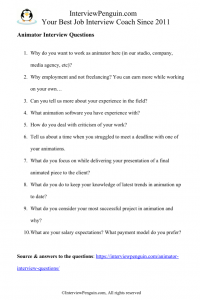Your portfolio will play a pivotal role in each interview for a job of an Animator. But a great portfolio alone does not guarantee that they will choose you for the job. Because communication with the clients and other members of the production team is also important, as well as your attitude to conflicts, deadlines, and other situations that will happen in the workplace, the challenges you will face.
In this article we will look at 10 questions you may face in your interview. I will try to give you an advice on how answer each one of them. Let’s start!
Table of Contents
Why do you want to work as animator here (in our studio, company, media agency, etc)?
Try to find the connection of your existing work with what they do in the company. You have certainly studied their past campaigns, movies, animations, or whatever, trying to understand what they do, the general direction they follow with their animations, and techniques they use.
And since it matches the direction you follow in your work, you find their place a good choice. What’s more, you will enjoy working on the things they do in the company. Your creative mind and soul will find something to devour in, and you believe to have an ability produce some excellent animations for their final pieces.
Another alternative consists in praising their place for some excellent employee benefits, modern equipment they have in place for the animators, great reputation, or anything else that make them stand out. Ensure them that they are your first choice, even if they aren’t…
Why employment and not freelancing? You can earn more while working on your own…
You have two options for a great answer. First one is saying that while you love working on animations, you hate the business part of freelancing. Taking care of client acquisition, marketing your services, keeping books, and doing all the other stuff just isn’t your cup of coffee. You want to devote all your working time to the activity you truly excel in, and enjoy–and that’s giving life to pictures and making amazing animations.
Second option is referring to lack of experience. You just aren’t confident enough to start business right now. You haven’t done much, do not have any connections in the field, and basically you will struggle to find clients. And without clients there is no business. Hence you prefer to work for some established brand–just like their company.
Can you tell us more about your experience in the field?
This is the moment to take your beautiful portfolio out of your briefcase, or open it on your laptop. Walk them through your best works, one by one. Take your time. Explain the goal of each animation, the techniques and software you used while creating it, and the final result.
You can also refer to some challenges you faced while working on this or that piece, and explain how you overcame them. Put special emphasis on animations that somehow relate to the work they do in the company. They should get an impression that you won’t need someone to spoon-feed you in the job, and will be able to get going right from the start.
* May also interest you: Video editor interview questions.
What animation software you have experience with?
Mentioning the names of the software products is fine, but you should elaborate on your answer. Regardless of whether you worked with Animate CC, Moho, TV Paint, or any other software, ensure them that you are tech savvy, and ready to learn to work quickly with any software they use in their studio.
What’s more, you can point out a few advantages (or unique functionality) of each animation software you’ve worked with up to this point. This demonstrates that you really worked with the products and know them inside-out, and aren’t just talking trash in an interview, making things up in order to say what the hiring managers want to heart from a good job candidate.
How do you deal with criticism of your work?
You may face a lot of criticism in this job, from both your employer and the clients. Ensure the hiring managers that you actually embrace constructive criticism, and love creative discussions with the clients.
Striving to constantly improve on your skills, you do not mind remaking something several times. At the same time, however, you put special emphasis on communication with the client. It is pivotal to discuss everything with them upfront–their goals, ideas, what they exactly want to see in the final result of your work.
You also try to stay in touch and update them regularly on your progress. Showing them partial results of your work and asking for feedback, you ensure that corrections are done on the go and you won’t need to remake everything from scratch once you deliver the final work.
* Check also: 7 sample answers to “Tell me about a time when your work was criticized.”
Tell us about a time when you struggled to meet a deadline with one of your animations.
Making animations is a tedious work, and it can easily happen that you miss a deadline, especially if client demands yet another remake.
However, try to pick a situation when you struggled, but eventually met the deadline. Explain how you planned your work properly, and worked systematically on it, reaching partial milestones on time. Then maybe you got some special request from the client or had to remake something significant, and fell behind with schedule.
But it did not discourage you. You tried your best, perhaps worked overtime for a few days, eliminated all distractions and secondary tasks, and eventually you managed to meet the deadline. Or you missed it, but you tried your best–effort matters the most here.
What do you focus on while delivering your presentation of a final animated piece to the client?
Ensure the hiring managers that you won’t just let it run and wait for the client to talk–unless you made something superb that will leave them dumbfounded, or need no further comments.
You will run the animation several times, and explain exactly what you did and why, what kind of impression you try to make on the viewers, and how it aligns with the goals of the client or the particular campaign.
What’s more, you will explain everything in simple language, avoiding technical terms, to make sure that a client understands you.
* Special Tip: You can download the full list of questions in a one page long PDF, print it, and practice your interview answers anytime later:

What do you do to keep your knowledge of latest trends in animation up to date?
You can refer to a few websites you follow, newsletters you receive, or conferences you attend. Just ensure them that you do not live in a bubble and aren’t satisfied with the status quo in your work–you always strive to learn new things and improve.
Another option is naming a few leading figures in animation, saying that you follow them on social media, which helps you to stay in the picture and watch the latest trends.
What do you consider your most successful project in animation and why?
Instead of focusing on prizes and accolades (if you received any), focus on the results the client achieved with the help of your work.
Maybe your animation got viral, and strongly improved the recognition of their brand. Or it was that part of movie/commercial/game which touches something within the viewer, and motivates them to make a desired action–for example purchasing something, or watching another episode, etc.
They may also ask you about your least successful animation. Ensure them that you know why it flopped, learned your lesson, and that this learning experience actually helped you to become a better animator.
What are your salary expectations? What payment model do you prefer?
Some companies may pay you on project basis, while other will pay you a regular monthly salary. Each model has some advantages, and though ambitious and motivated animators will opt for getting money for each project, you won’t do badly saying that you prefer a regular monthly salary. You just have to explain why–for example you have a family and look for stability. Earning 10K one month and 2K the next one isn’t really viable for you. If it was, you would opt for freelancing.
Another option is saying that the salary isn’t a deciding factor for you. You like what they do in the studio, and want to join their team. Hence you will accept the payment model they use with each new animator in the company. This way you won’t end up underpaid, and still have a chance to negotiate a better salary once they explain the typical payment model to you.
Conclusion, next steps
Interview for a job of an Animator belongs to interviews with average difficulty. The demand for animators is all-time high, and not many people have the skills to apply. Hence it may easily happen that you are the only job candidate, or one of a few.
On the flip side, they won’t hire you unless you can demonstrate your experience and skills with a portfolio. It doesn’t mean that you have to have dozens of completed projects. Few great pieces are enough to make an impression, as long as you manage to explain your work and the goals you tried to achieve with each animation…
I hope you will manage to do it, and wish you good luck in your interview!
Matthew
May also interest you:
- How to overcome interview nerves – 4 strategies that will help you calm down on the big day, and show your very best.
- 15 most common interview questions – What motivates you in work? What are your weaknesses? Why should we hire you instead of the other applicant? Learn how to answer some questions that you can face while interviewing for any job.

